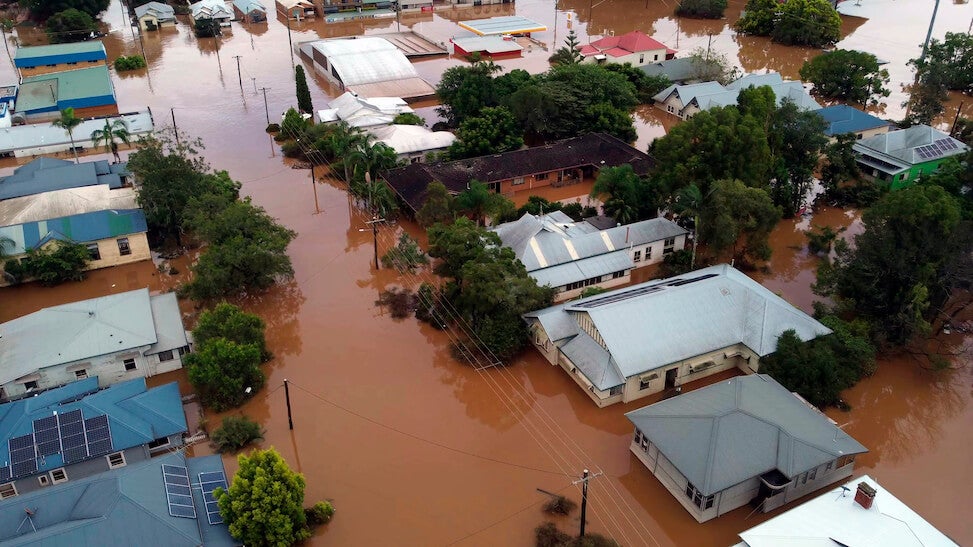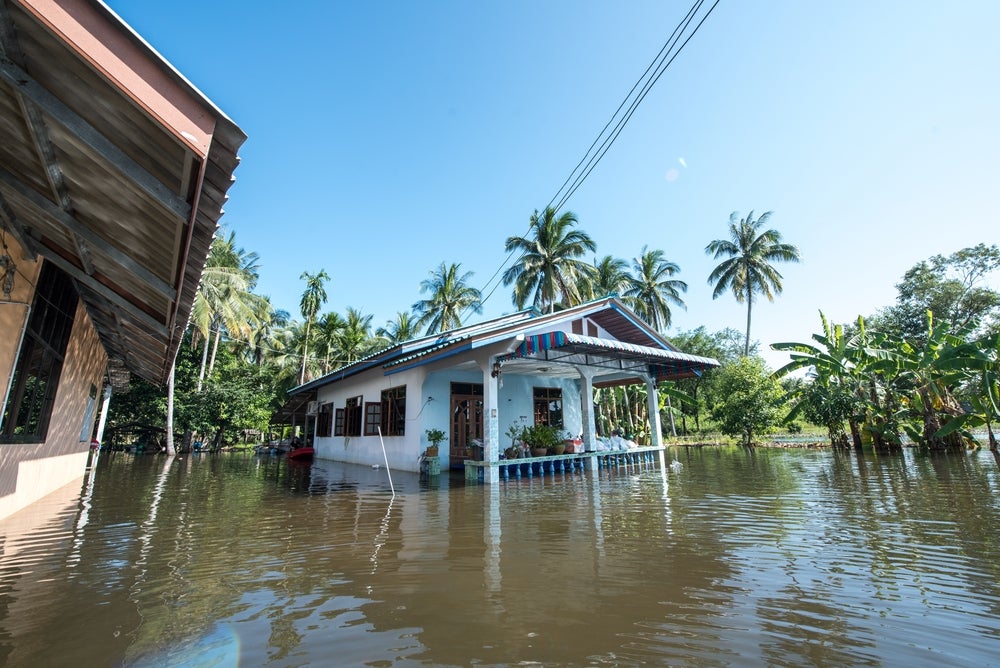
Flood insurance
Protect your home from flood damage. Get a flood insurance quote online today.
Get affordable flood insurance for your home
For too long, flood insurance has been expensive, complicated, and limited in its protection. That’s why Kin is proud to offer flood insurance through our carrier partners that can be easily added on to your home insurance policy.
No separate policies. No separate deductibles. Just affordable, easy coverage.
Florida and Louisana homeowners can click the button to get a quote for home insurance with a flood endorsement. Kin customers should call 855-717-0022 to speak to a representative.
Percent of Florida homes
that could get lower rates
with private flood insurance:
77%
Kin Flood Insurance Benefits
-
You pay one premium for both your home and flood insurance.
-
Your AOP or hurricane deductible applies for both home and flood insurance claims.
-
We handle all your home and flood insurance questions.
Flood coverage: Kin partners vs. NFIP
Because flood insurance is the only type of coverage that can pay for damage to a home caused by storm surges, it’s important this protection is affordable and readily available to homeowners who need it most.
| Available coverage | Kin | NFIP |
|---|---|---|
| Covers insured up to policy limits for dwelling, personal property, and other structures | Yes | No, maximum $250k for dwelling, $100k for personal property |
| Offers replacement cost coverage | Yes | Yes |
| Effective immediately | In FL | No, 30-day waiting period |
| Elevation certificate required | Optional | Yes |
| Offered as an endorsement | Yes | No |
| Available for seasonal homes | Yes | Yes, but at an additional cost |
What does flood insurance cost?
The average annual cost of flood insurance in the US is $995 when purchased from the National Flood Insurance Program (NFIP). In Florida, it’s $958 per year for single family homes. Depending on which flood zone your home is in, flood insurance rates can range anywhere from $190 to $2,000.
The cost of flood insurance is based on:
- Where your home is located.
- What its elevation is.
- The deductible and coverage limits you chose.
Factors like this are taken into account when companies quote flood insurance. Where you buy flood insurance impacts your premium, too. A study found that 77% of homes in Florida could get lower rates through private flood insurance rather than the NFIP.
Getting a flood insurance quote is easy if you're a policyholder in Florida or Louisiana. Just give us a call at 855-717-0022.
New to Kin? Then click the button and enter your addres to get started on a home insurance quote with a flood endorsement.

What is flood insurance?
Flood insurance covers storm surge damage to your property, other structures, and personal belongings. While standard home insurance in Florida and other states can cover water damage from internal sources, like a burst pipe, it usually doesn’t cover damage caused by floods. Only flood insurance can do that.
Floods occur when two or more acres of normally dry land are inundated by water or mudflow. And they happen more often than you might think.
Every region of the United States experiences floods, according to the Federal Emergency Management Agency (FEMA). In fact, 90% of all natural disasters in the country involve some kind of flooding. About 20 to 25% of flood claims happen in areas considered low risk for floods.
The kicker? Even one inch of standing water can cause approximately $25,000 in damages to your home. Keep that in mind when reviewing flood insurance quotes.
-
90%
of all natural disasters in the country involve some kind of flooding -
25%
of flood claims happen in low-risk areas
-
$25,000
the potential cost of structural damage caused by one inch of water
What's Covered?
- Electrical, heating, cooling, and plumbing systems.
- Appliances
Refrigerators, stoves, washers, and dryers.
- Built-in bookcases, cabinets, and paneling.
- Foundation, walls, anchorage systems, and staircases attached to the structure.
- A detached garage.
- Personal property
Clothing, furniture, and electronic equipment that isn’t stored in the basement.
- Valuables, like artwork and furs
Up to $2,500 in value
- Groundwater seepage, mudslides, and floods caused by broken water mains.
What’s Not?
- Moisture or mold/mildew damage that the homeowner could’ve prevented
- Currency, precious metals, and paper valuables
- Outdoor property
Landscaping, patios, fences, decks, septic systems, and pools
- Additional living expenses when a flood makes the home uninhabitable
- Cars and other vehicles
- Earthquakes and earth movements caused by floods
- Water damage to personal belongings in basements and crawl spaces
Is flood insurance required?
Wondering if you need to search for “flood insurance near me” and whether it’s a requirement in your area? That depends on where you live and what your mortgage situation is like. For example, if your home is in a high-risk flood zone or Special Flood Hazard Areas (SFHAs) – locations with 25% chance of being flooded within 30 years – and you have a mortgage through a federally backed lender, you’re required to have home flood insurance. Many mortgage lenders require flood insurance if your home is near a body of water, too.
Do you need flood insurance if you don’t have a mortgage?
If you don’t have a mortgage, you may not be required to buy flood insurance, but it’s risky not to. The Florida panhandle, the Gulf of Mexico, the Atlantic Coast, and the Mississippi River, and even areas in the Rockies face the threat of floods.
Up to 25% of all flood claims happen in low-to-moderate risk areas. That’s why even if you aren’t required to have homeowners flood insurance in your area, it’s still a smart investment.

Up to 25% of all flood claims come from low-to-moderate risk flood areas.
How much flood insurance do I need?
If you have a mortgage, you’ll usually be required to have flood insurance equal to the cost of developing your property or up to the maximum coverage limit available – whichever is lower.
Another useful benchmark is to have coverage equal the value of your home, other structures, and belongings. Your insurance provider can help you determine what makes sense for your needs.
When should homeowners buy flood insurance?
Get flood insurance before you need it. No insurance policy will retroactively cover flood damage you already have, so it’s important to have flood coverage in place before a disaster strikes. Consider purchasing flood insurance well before flood and hurricane seasons begin.
If you’re looking at flood policies during hurricane season, be aware that a tropical storm warning may delay your ability to purchase coverage if there’s a moratorium.
Our partner’s flood coverage is effective as soon as you buy it, but National Flood Insurance Program policies don’t take effect until 30 days after purchase. Keep those timetables in mind when shopping.
Cover your home from floods with Kin
Floods can happen to any home, at any time. Unfortunately, many homeowners aren’t aware of how serious their flood risk is until it’s too late. Remember, too, that a flood doesn’t have to be catastrophic to cause a lot of damage to your home. Even a small one can cause thousands of dollars in repair bills.
The good news is that you can take steps to protect your home before disasters hit. Key among these is adding flood insurance. Getting this coverage can help you rest easy knowing your home is protected.
It’s never too early to prepare for the worst. But you do want to find the right flood coverage insurance policy for your home.
We’re here to help. If you’re a homeowner who needs flood insurance in Florida or Louisiana, you can get coverage through Kin. Our goal is to make accessing flood insurance coverage easier and more affordable by working with carriers that offer this essential protection as an endorsement. This allows you to get broader coverage more quickly than you would with a standalone policy. Plus, you get access to our insurance experts who will work hard to make filing flood insurance claims easier.
How to get flood insurance
While you can’t purchase flood insurance directly from the National Flood Insurance Program, you can purchase flood insurance directly from Kin. Just apply for a flood insurance quote online – we’ll handle the rest.

Check out how much our customers love Kin
The opinions expressed belong solely to individual reviewers and do not reflect the opinions of the Kin Insurance, Inc. group of companies or affiliates. Reviews are provided for informational purposes only.
Related Posts:Get more answers
Displaying post 1 / 3
